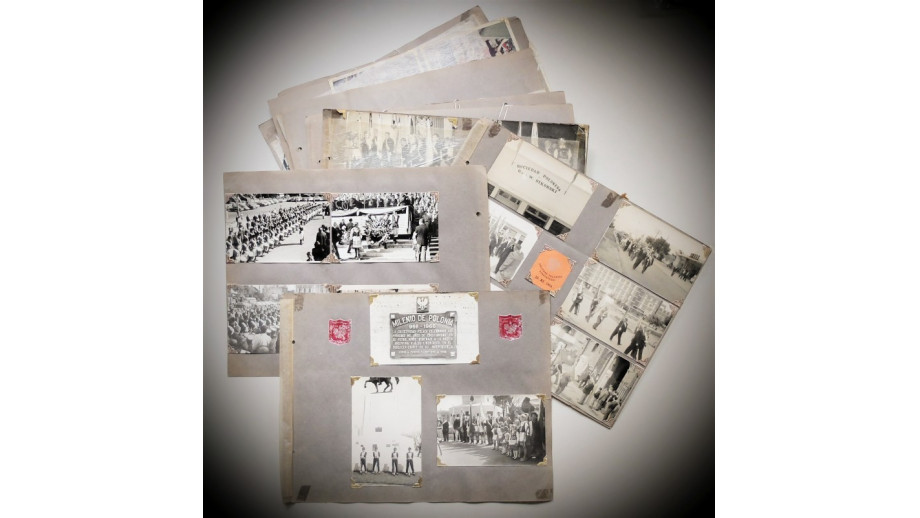News

On the fourth of June, the Ignacy Domeyka Polish Library in Buenos Aires celebrated its 80th anniversary - the only institution in Argentina that popularises knowledge about Poland and the Polish community in Argentina. In recent years, the library has been cooperating with the State Archives, the KARTA Centre Foundation, and the POLONIKA Institute, which has financed the project to digitise part of the collection. The anniversary is a good opportunity to recall and bring closer both the history and activities of this unique emigration institution and the people associated with it.
Initially, the aim of the institution was to collect polonicas (written documents, objects, or places of Polish origin or thematically connected with Poland), document the life of the Polish community, and provide information about Poland. The first president of the Polish Library was Jeremi Stempowski, and the location was a palace donated by Karol count Orlowski. In later years, thanks to, inter alia, the initiative of Irena Nawrot, for many years the head of the Library, the mission of the institution was extended to include teaching the Polish language, educational and cultural activities, and promoting Polish culture. Over time, the library has become an important source base for scientists and researchers.
For many years, the institution was financed solely from contributions and operated on a voluntary basis. In a circular preceding the opening of the institution, the Founding Committee appealed to fellow countrymen, representatives of science and art, as well as social activists for donations to create “an indelible trace of our stay here and a permanent monument to Polish science and culture”. The list of founding members includes, among others, Aleksander Janta-Połczyński, Witold Małcużyński, writer Józefa Radzymińska, Witold Gombrowicz, Wiktor Ostrowski, Florian Czarnyszewicz, and Kazimierz Domeyko, a descendant of Ignacy. The initiative to establish the Polish Library was supported by the famous Argentinean writer Jorge Luis Borges, then director of the National Library in Buenos Aires, and later patron of the street where the Library found its final location. The decision to build a pavilion for the future location of the Library was possible thanks to the legacy of engineer Jan Kadenacy and other donors. The first books were sent to Buenos Aires from the Polish Library in Paris, the Polish Museum in Rapperswil (Switzerland), and private collections.
In the Library Council, the first generation of the post-war Polish émigrés was very active, among them Rev. Prelate Dr. Jerzy Bekier, a former prisoner of Dachau concentration camp, Eng. Ryszard Białous, known above all as the commander of the 'Zoska' battalion (scouting battalion of the Polish resistance during WWII – translator’s note) in the Warsaw Uprising, Czesław Borowicz, Prof. Czesław Czarnowski, Natalia Dąbrowska, soldier of the Polish Armed Forces II Corps, Waleria Fuksa, Zygmunt Grocholski, graphic artist, Prof. Bogumił Jasinowski, philosopher and lecturer at the University of Santiago de Chile, and Dr. Stanisław Szwejs. Dr Jan Wolski was responsible for the inventory of books. Among the volunteers involved in library work over the years was also Henryk Mittelstaedt, the future Knight of the Order of Polonia Restituta.
Today, the Library's collection consists of over 22 thousand items in the inventory, including, inter alia, Polish literature and polonicas, valuable yearbooks of Polish community magazines, and a collection of nearly 300 films. It is supplemented mainly by contributions from the National Library, the Semper Polonia Foundation, the Adam Mickiewicz Institute in Warsaw, the Museum of Literature in Warsaw, and individuals.
One of the most difficult events for the Library was the fire in 2005 that consumed part of the building and, fortunately, only a small part of the collection. The reconstruction of the premises was financed by the Polish Community Association. Thanks to the support of the Ministry of Culture and National Heritage, the Adam Mickiewicz Institute, and the Association of Poles in Argentina, a team from the Department of Paper and Leather Conservation at the Nicolaus Copernicus University in Toruń was funded to stay in Buenos Aires.
In recent years, the Library's relations with its home institutions have become increasingly frequent. In 2012, in cooperation with the KARTA Center Foundation, the Library founded the Digital Archive of Local Tradition in Buenos Aires. For four years, the team has digitised 3900 photographs and recorded 55 biographical accounts of Poles and people of Polish origin in Argentina. A collection was created, which broadly tells about Polish emigrants in Argentina. It is presented on the website library.domeyki.archives.org
In 2018, the POLONIKA Institute, appointed by the Minister of Culture and National Heritage Professor Piotr Gliński, financed a project describing the Library's photographic collections and the digitisation of parts of these collections. The photographic history of Polish emigrants from the collection of the Ignacy Domeyko Polish Library in Buenos Aires can be seen on the Institute's website.
For several years now, there has also been intensive cooperation between the archivists of the Head Office of State Archives and the National Digital Archive with this meritorious Argentinean Polish institution.
The Ignacy Domeyko Polish Library in Buenos Aires is a member of the Permanent Conference of Polish Museums, Archives, and Libraries in the West (MABPZ).
[source: MKiDN]